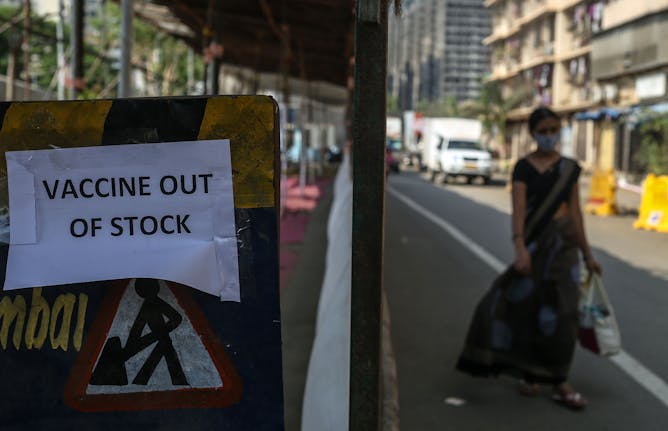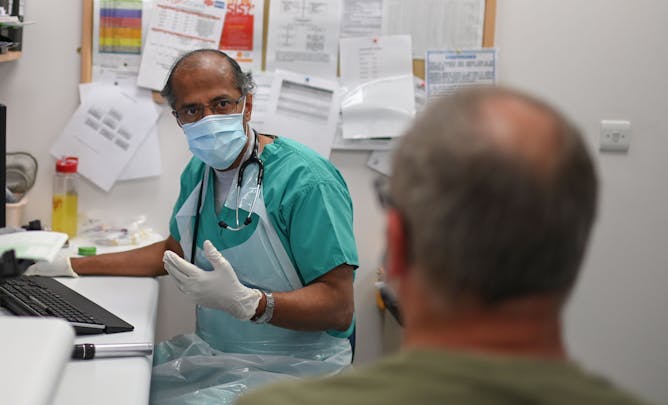|
|
|
|
As a deadly second wave of COVID-19 ravaged India, the country opened up its vaccination programme to all adults on May 1. But supply shortages mean in some parts of the country, vaccination centres have temporarily shut and there are often no slots available for months on the app used to book an appointment.
“Some people joke that it’s easier to climb Mount Everest than getting a vaccine in India,” the economist R. Ramakumar explains in the latest episode of The Conversation Weekly podcast which looks at why the country’s rollout is faltering. He’s concerned about changes to the distribution and pricing system for the vaccines, which he worries could leave millions unvaccinated.
The rest of the world is now attempting to monitor the spread of the coronavirus variant called B1617, first identified in India, which was labelled a “variant of concern” earlier this week by the World Health Organization. In England, a rise in cases of the B16172 version of this variant is raising questions about whether to continue with a further easing of restrictions next week. Deborah Dunn-Waters explains why scientists are watching the situation very closely.
In parts of Lancashire, where cases of this variant are increasing, vaccine appointments are being opened up next week to everyone over 18. For those still hesitant about getting a jab, new research suggests that messaging which emphasises the personal, rather than collective benefits, works best at persuading them.
If you love reading and listening to The Conversation, please consider making whatever donation you can, whether a monthly gift or a one off, to help us keep delivering news you can trust from experts who know what they're talking about.
Donate now
|
Gemma Ware
Editor and Co-Host, The Conversation Weekly Podcast
|

|
|

A vaccination centre in Mumbai, closed due to lack of supplies in late April.
Divyakant Solanki/EPA
Gemma Ware, The Conversation; Daniel Merino, The Conversation
Plus, the hidden world of microscopic fungi found inside the world's biggest seed bank. Listen to episode 15 of The Conversation Weekly podcast.
|

Andreas Prott/Alamy Stock Photo
Deborah Dunn-Walters, University of Surrey
There's still a lot we don't know about the latest variant of concern: B16172.
|

Daniel Leal-Olivas/EPA-EFE
Daniel Freeman, University of Oxford
New research suggests hearing about the collective benefits of COVID-19 vaccines is unlikely to change people's minds, which contradicts previous findings.
|
Health + Medicine
|
-
Hannah Burnett, University of Glasgow; Jonathan Olsen, University of Glasgow; Rich Mitchell, University of Glasgow
Spending time in nature is an essential resource for mental wellbeing, but lockdown increased existing inequalities in the way our green spaces are used - and who is able to benefit from them.
-
Mitul Mehta, King's College London; Eric Lynch, King's College London
Blood samples help doctors know whether a treatment is effective or not – and this device can provide this information almost instantly.
-
Rob Reddick, The Conversation
The B16172 variant of concern risks spreading in the UK when restrictions on indoor socialising ease on May 17.
-
Gabriel Recchia, University of Cambridge
Members of the public were more overconfident and less accurate in predicting the likely number of infections and deaths, but both groups missed the mark.
-
Barbara Jacquelyn Sahakian, University of Cambridge; Christelle Langley, University of Cambridge; Julian Savulescu, University of Oxford
Vaccine passports are small sacrifice to make for the greater good.
|
|
Science + Technology
|
-
Steffi Paladini, Birmingham City University
China's leading role in the new space race could have a positive effect on geopolitics and science alike.
-
Philippa Williams, Queen Mary University of London; Lipika Kamra, O.P. Jindal Global University
Accessing India's digital consumers is seen as the key to future growth for big tech companies like Facebook.
-
Craig Anderson, University of Glasgow
We used probability to find out what collecting all 678 stickers might cost you.
|
|
Business + Economy
|
-
Gavin Brown, University of Liverpool
Bitcoin prices have plunged after the world's second richest person tweeted that Tesla would no longer accept the cryptocurrency.
-
Bernadette O'Hare, University of St Andrews; Kyle McNabb, Overseas Development Institute; Stephen Hall, University of Leicester
Lost revenue is money that could be spent on lifting people out of poverty.
|
|
Politics + Society
|
-
Beth Breeze, University of Kent; Genevieve Shaker, IUPUI
Our preoccupation with the personal relationships of big donors are overshadowing charitable efforts.
|
|
Arts + Culture
|
-
James Brown, University of Sheffield
To stave off illness and melancholy, moderate drinking was advised by doctors.
|
|
Environment + Energy
|
-
Jessica Omukuti, University of York
We need to know who gets what, and how money is used once it is allocated.
|
|
| |
Featured events
|

|
Online, Online, Oxfordshire, N/A, United Kingdom of Great Britain and Northern Ireland — University of Oxford
|

|
Online, Cambridge, Cambridgeshire, CB11PT, United Kingdom of Great Britain and Northern Ireland — Anglia Ruskin University
|

|
University of Reading, Whiteknights House, PO Box 217, Reading, Reading, RG6 6AH, United Kingdom of Great Britain and Northern Ireland — University of Reading
|

|
Sustainable Places Research Institute, Cardiff University, Cardiff, Cardiff [Caerdydd GB-CRD], CF10 3BA, United Kingdom of Great Britain and Northern Ireland — Cardiff University
|
|
|
|
| |
| |
| |
| |
| |
|
|
|
|
|
|
|